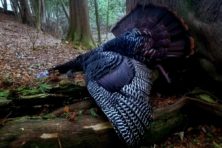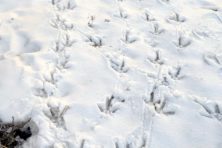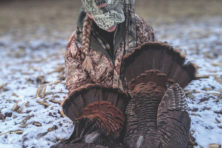WILD THINGS: First Ice Not All Nice
- Share
- Tweet
- Pin
- Share

A predicted thaw next week is not what ice anglers and snow enthusiasts were hoping for.
Frigid weather that arrived after last weekend’s blizzard has been good for making ice, but high winds much of the week prevented a total freeze on the vast waters of Green Bay.
While a few anglers have been venturing off shore at select locations this week – mainly in protected bays, harbors and marinas – it’s certainly not time to just head out based on looks alone.
The extended wind forecast showed a north blow Friday, west Saturday and a strong southwest flow Sunday and Monday as temperatures begin to climb. When it comes to fishing the southern Door County shoreline, anything strong from the south can cause problems when there’s so much open water miles off shore in the central bay.
The large breaks in ice cover and winds create an ideal environment for the ice to drift around, pile up, or even break free from shorelines or pressure cracks.
Even if planning to stick to the more protected areas, be aware that drifted snow can insulate thin ice and prevent it from getting strong enough to support the weight of a snowmobile, four-wheeler, UTV or even a cautious angler on foot. There are also a lot of spots with busted and refrozen ice, which is not as strong as ice that sets under ideal conditions.
In short, it’s wise to use an ice chisel to test thickness as you go, and have emergency gear handy: a set of ice picks attached to your sleeve or clipped onto your jacket, a long length of rope to throw in case someone else falls through, and a cell phone kept in a waterproof case. The use of float or life jackets are encouraged.
This weekend, Jan. 20-21, is Wisconsin’s annual winter Free Fishing Weekend. You won’t need a license or stamp, but all other regulations apply. If you’re new to the sport, be sure to seek the advice of experienced anglers before heading out.
Meanwhile, ice skaters have been out scouting and shoveling new ice this week. Parents and guardians should talk with their children about staying away from the ice unless there’s adult supervision.
Conditions for snowshoeing and cross-country skiing are ideal. Testing out the trails at state parks and or exploring off trail in nature areas is great exercise. Keep in mind that conditions could get icy next week, if temperatures warm into the mid- to upper 30s as predicted.
Backyard Bird Count
The Great Backyard Bird Count is four weeks off yet, but now’s the time to prepare for the Feb. 16-19 event. The count uses two tools for reporting sightings: the Merlin Bird ID app or eBird.
Merlin Bird ID app is a great way to identify birds, especially if you are new to birding. You can’t report the number of birds for each species using the Merlin Bird ID app, but saying you “saw X bird at X location” is still important data. If you would rather report the number of birds you see, eBird is the better tool.
Try the free online eBird Essentials course if you want to up your birding game. It’s a self-paced course that will help you gain confidence. Learn more at academy.allaboutbirds.org/product/ebird-essentials/.
Rabbit Hunts Set
Calling all beagle owners: a pair of cottontail rabbit hunts with prizes are set for Jan. 20 (Algoma Hunting & Fishing Club’s 1st annual Bunny Hunt) and Feb. 25 (Muskrat City Sportsmen’s Club’s 24th annual Bunny Hunt).
Get a registration form and rules for the first one by contacting Aheart (920.255.8557), or in person at the club, N7809 Willow Drive, Algoma. Pre-registration ends at 9 pm, Jan. 19.
For the Muskrat City event, pre-register at the clubhouse Feb. 24 from 3-9 pm. It’s located at 4879 First Road, about two miles north of Kewaunee and a mile west of state Highway 42. More info: Scott, 920.255.1309.
Woods and Water
•Through Jan. 15, Door and Kewaunee county hunters had registered 6,488 whitetails, including 3,022 bucks. Statewide, 292,683 deer had been registered, including 146,937 antlered bucks and 145,746 antlerless deer.
•Lake Michigan water levels are about an inch higher than they were at this time last year, and are about 4 inches above the 100-year average. Levels have dropped more than 30 inches since the all-time January high in 2020.




